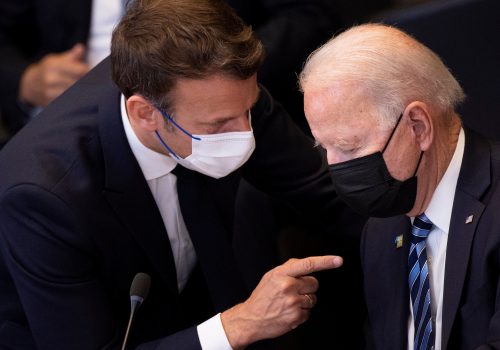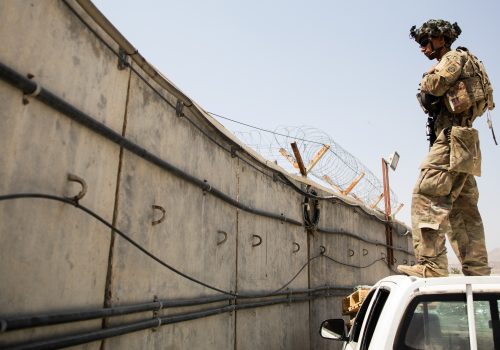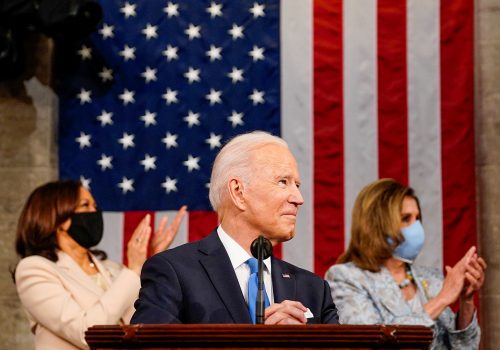FAST THINKING: Biden’s UN reality check
JUST IN
Rhetoric, meet reality. In his first address to the United Nations General Assembly, US President Joe Biden declared that after twenty years of “relentless war, we’re opening a new era of relentless diplomacy.” But can that relentlessness overcome transatlantic strains over the US withdrawal from Afghanistan and a nuclear-powered submarine deal with Australia and the United Kingdom, not to mention a still-raging pandemic and climate crisis? Here’s what our equally relentless experts have to say.
TODAY’S EXPERT REACTION COURTESY OF
- Daniel Fried (@AmbDanFried): Weiser Family distinguished fellow and former US assistant secretary of state for Europe and Eurasia
- Emma Ashford (@EmmaMAshford): Resident senior fellow with the New American Engagement Initiative in the Scowcroft Center for Strategy and Security
Not the former guy
- Our experts note how Biden sought a break with his predecessor by embracing US alliances and portraying a global clash between democracies and autocracies. “Biden’s appeal to a rules-based international order aligned him with US presidents since Franklin D. Roosevelt and contrasted him with the unilateralist nationalism of former President Donald Trump,” Dan tells us.
- Dan was particularly taken with Biden’s “most stirring language extoll[ing] the advocates of the democratic world” from Cuba to Belarus to Myanmar.
- “This was a welcomed restatement of US purposes: generous in seeing the advance of values and US interests as being linked,” Dan says. “But reality is apt to complicate these principles, as it always does.”
- We’ve seen plenty of examples in recent weeks of reality intruding on such rhetoric. Rama notes that the vision of “Biden as champion of multilateralism” is actually “the opposite of the impression left [among] some of his allies with the unilateral withdrawal from Afghanistan or the crisis of the submarines.”
War, what is it good for?
- Though “admirably pragmatic,” the speech in Emma’s eyes “was out of step with realities on the ground” when Biden spoke about moving on from “relentless war.”
- “American troops are still deployed to a variety of combat zones—from Syria to Niger—and there has been far less progress in ending that aspect of the global war on terror,” Emma says.
- Her proposed remedy? Congress should repeal the authorizations for the use of military force that have given four presidents free rein to deploy troops around the world.
Future focus
- Rama notes that Biden’s “main commitments for the future go through Africa”—from climate change to the pandemic to the war on terror to emerging technologies.
- “His strategy of containment of China prioritizes the Indo-Pacific,” Rama points out. “We would like to know if he plans the same on the African continent, which is a tough battleground [in] this competition between global powers.”
- Biden talked of a “decisive decade” ahead for the climate, Emma notes, but that statement “could as easily apply to the future direction of US foreign policy and the world order.”
Further reading
Tue, Sep 21, 2021
Experts react: The AUKUS deal has shaken the transatlantic alliance. What should the US and its allies do now?
Experts react By
The Biden administration's sunny declarations about America being "back" are facing a sobering reality check.
Tue, Aug 31, 2021
FAST THINKING: The war is over, but the Afghanistan mission continues
Fast Thinking By
What will continued US engagement in Afghanistan look like? How will the Taliban govern? What will become of the country’s refugees?
Thu, Apr 29, 2021
FAST THINKING: Biden’s challenge to China and Congress
Fast Thinking By
President Joe Biden described an array of challenges at home and abroad during a speech to a joint session of Congress on Wednesday to mark one hundred whirlwind days in office. To a socially distanced hall of masked dignitaries, Biden staked out ambitious domestic plans and placed them in the frame of broader competition with China to “win the 21st century.”
Image: U.S. President Joe Biden speaks during the 76th Session of the U.N. General Assembly in New York City, U.S., September 21, 2021. REUTERS/Eduardo Munoz/Pool


